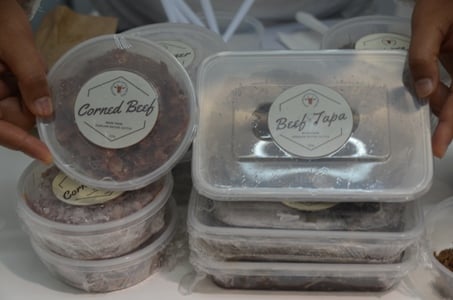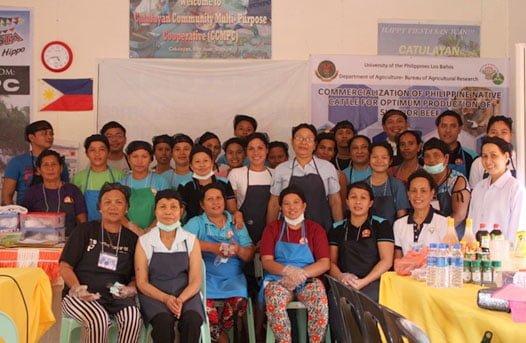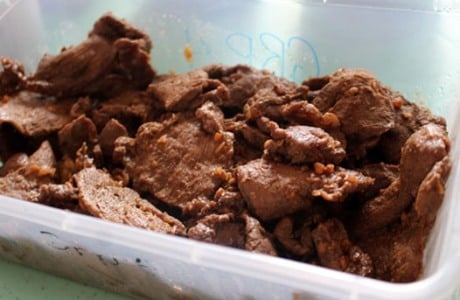Siquijor,
a tiny island province known for its mysterious and bewitching tourist
attractions, is likely to be famed for yet another of its best and
finest product — its beef.

This is not something to be surprised about since agriculture is a predominant sector in Siquijor and cattle raising, a significant agricultural activity.
Nestled between the Visayas and Mindano group of islands, Siquijor ranks second among the highest cattle producing provinces in the country, next to Ilocos Norte.
The native cattle strain in Siquijor is the taurine type (Bos taurus) known to have genes for marbling making it competitive with the rest of the best beef cattle in the world. Marbling is the white flecks and streaks of fat within the lean sections of meat. The degree of marbling is the primary determination of quality grade in beef. Marbling has a beneficial effect on the juiciness and flavor of beef as it keeps beef moist and succulent.
Bos taurus is a grass-fed type of cattle. Hence, the meat is lean and tender and has moderately full flavor. This native cattle strain is suitable for Siquijor’s weather condition because it can tolerate the heat and it needs little water requirement. It can also easily adapt to the environment. This is also the reason why this breed is preferred by majority of the farmers in Siquijor. This native breed is also known to produce quality milk.

And because Bos taurus is a grass-fed cattle, Siquijor’s locally-produced beef is considered a healthy beef. With the promising potential of the native strain, it is important to enrich the cattle production and meat processing industry to help the breeders raise their income, and provide an opportunity for Siquijor to export its quality meat globally.
R&D project on Siquijor beef production
In Siquijor, the cattle industry is hounded mainly by two aspects: production and marketing. Major constraint in production is affected by the dry season in Siquijor resulting to limited water supply, limited food supply, and excessive heat that can affect cattle raising. The natural climatic condition and sloping topography of Siquijor greatly affect the feeding practice of farmers especially during the dry season. In terms of marketing, one major challenge is the unfair pricing of traders due to lack of price standard.
Dr. Agapita Salces of the Institute of Animal Science, University of the Philippines Los Baños (UPLB), conducted a study that will not only address these challenges in production and marketing but more importantly, will commercialize the production of Siquijor beef as healthy meat.
The UPLB-led project, “Commercialization of Philippine Native Cattle for Optimum Production of Siquijor Beef” is being funded by the Bureau of Agricultural Research through its National Technology Commercialization Program. Specifically, the project will develop native beef grading standard, native beef cuts, and beef products and by-products.
In collaboration with the Department of Agriculture – Regional Field Office 7 and the Province of Siquijor – Provincial Veterinary Office, the project is employing various science-based interventions including data collection of animal performance, development of software for small hold native cattle production, planting of forage trees and legumes, and meat processing and product development.

Profitability of cattle raising
Results of the socio-demographic analysis conducted by the group of Dr. Salces showed that an average cattle farmer in Siquijor has three cattle per farm being raised in a land he owns through inheritance. The rate of technology adoption of cattle raisers in Siquijor is high due to the various support provided by the provincial government.
In the profitability analysis of the project, results showed that the investment cost for setting up a cattle enterprise will cost Php 22, 555. 51. This comprised of cattle house, feeding, breeding stock (two young cattle one male and one female), farm tools (drum, containers, pail and scythe). However, if the cost of land will be included the total investment cost is Php 101,703.65.
The three-cattle operation in Siquijor is considered successful in increasing the income of the farmer. In terms of net income, results showed that a farmer could expect at least Php1,000 increase monthly when he choose to engage in the cow-calf operation in Siquijor.
General assessment of the results showed that good cultural management practices employed by the raisers could not be translated into profit until problems in marketing is resolved. This is attributed to the lack of price standard in Siquijor.
Product development and marketing

One of the interventions of the project was meat processing and product development through the conduct of training. One of the beneficiaries of the project was the Catulayan Community Multi-Purpose Cooperative wherein members were taught how to process and add value to their beef products. In 2017, 33 members of the Cooperative underwent the training in Siquijor. Dr. Maria Cynthia Oliveros, project study leader, demonstrated how to process beef tapa, corned beef, burger patties, and beef floss.
Meat processing was introduced to the members to increase their income and to promote the quality of native Siquijor beef. They were also taught how to look at fresh meat including the physical and chemical properties of meat to ensure its quality, tenderness of the mat during processing and storage, and even the correct meat cut. Another aspect of the training was teaching them about meat spoilage and proper handling to maintain food safety and avoid food poisoning.
Aside from meat processing, 11 members of the Cooperative also underwent slaughter and beef fabrication training. They were exposed to existing beef grading standards and beef cuts. Leading the training were Dr. Oliveros and Dr. Salces.
The various meat products were exhibited during the 14th Agriculture and Fisheries Technology Forum and Product Exhibition held on August 30-September 2, 2019 at SM Megamall, Mandaluyong. ### (Rita T. dela Cruz)
---------- For more information, please contact: Dr. Agapita Salces Project Leader Institute of Animal Science UPLB, College, Laguna Tel. (049) 536-2547 Email: ajsalces@gmail.com
